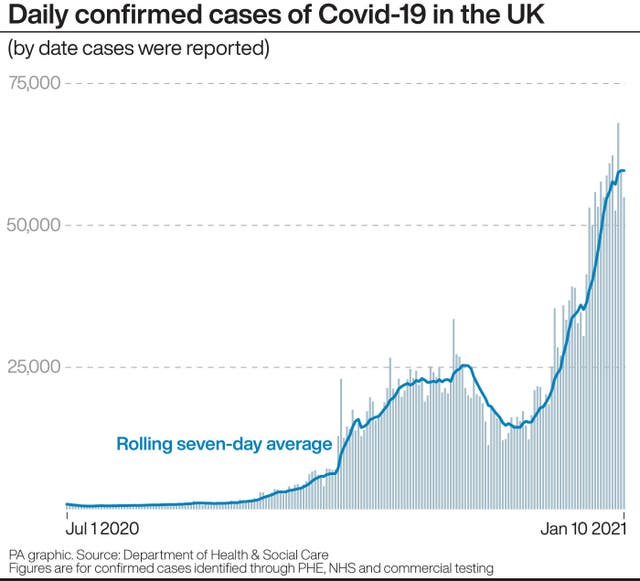Minister raises concerns over supermarkets and exercise rule-breaking
Vaccines minister Nadhim Zahawi said he is worried shops are becoming too crowded and exercise sessions are being used for social interactions.

Vaccines minister Nadhim Zahawi has raised concerns that people are not complying with lockdown rules closely enough in supermarkets and when exercising amid suggestions the restrictions may need to be toughened.
As the Government launched a drive to ensure the public abide by the coronavirus rules, Mr Zahawi said he is worried that social interactions are taking place in parks under the cover of exercise and masks are not being worn inside shops, which may be becoming too crowded.
England’s chief medical officer, Professor Chris Whitty, urged the public to “stay at home unless you absolutely have to” as the next few weeks will be the “worst weeks of the pandemic”.
Prime Minister Boris Johnson has reportedly discussed the prospect of introducing tougher controls to ensure the public abide by the restrictions, with the new highly-contagious variant raising the stakes.
As mass vaccination sites opened on Monday, Mr Zahawi was unable to give assurances that the current restrictions are sufficient, and raised concerns of people not complying with the rules.
“We don’t want to use tougher measures, the lockdown is tough, schools are shut, but it is important to remember this virus loves social interactions,” he told BBC Radio 4’s Today programme.
“We’re reviewing all the restrictions, but these are pretty tough at the moment. I am worried about supermarkets and people actually wearing masks and following the one-way system and making sure when it’s at capacity they wait outside the supermarket.
“I’m worried about some of the pictures I’ve seen of social interactions in parks, if you have to exercise you can go out for exercise only.”
Health Secretary Matt Hancock has warned that “every flex can be fatal” as he backed more stringent enforcement of the lockdown by police on Sunday.
The Telegraph quoted a Government source as suggesting restrictions on exercise could be tightened while expressing concerns that people are using the allowance to socialise.
Prof Whitty said the “new variant undoubtedly makes every situation slightly more dangerous than it was”, but that the risk outdoors “remains low” providing the rules are followed.
“It still remains the case that it’s much lower transmission outdoors provided people keep their distance,” he told Today.

“If people, for example, are crowded together in a queue outdoors, if they’re really huddled together round a market stall or something, that is a risk with this virus and in that situation there might be some logic to people thinking about wearing masks.”
The majority of outbreaks examined by Public Health England last week came from care homes, where 749 incidents were recorded. A total of 166 came from workplaces, 79 from hospitals, 33 were from educational settings such as schools and 11 were from food outlets. Some 257 incidents were recorded as being from other settings.
Labour leader Sir Keir Starmer raised concerns that the current restrictions are not tough enough, saying nurseries being open “needs to be looked at” and suggesting that house viewings should be reconsidered.
“So we’re in this extraordinary situation where having got to at least as serious if not a more serious position than of March last year, we’ve got lesser restrictions in place and we need those in place as quickly as possible,” he said after a speech on Monday.
“I do think that the vast majority of the public are complying with the rules.”
But Devon and Cornwall Police Deputy Chief Constable Paul Netherton warned that people are getting “fed up” with lockdown restrictions and compliance has dropped.
“What’s happening is people are beginning to flout the rules, they are beginning to think ‘How can I get away with the rules?'” he told BBC Breakfast.
Asked whether it was harder to get people to comply with rules in the current lockdown compared with the previous two, he said: “Yes, I think people are beginning to get fed up with it.
“I can understand that but we have to be firm, we have to save lives, we have to make sure people are keeping apart, isolating and staying at home.”
Some experts have said the current lockdown measures are not strict enough, in the face of the more transmissible variant which has spread rapidly in many parts of the country.
Professor Peter Horby, who chairs the Government’s new and emerging respiratory virus threats advisory group (Nervtag), said the Kent variant has made the situation “more risky” and “we’re going to have to be even stricter” if the infection rate does not decrease.





